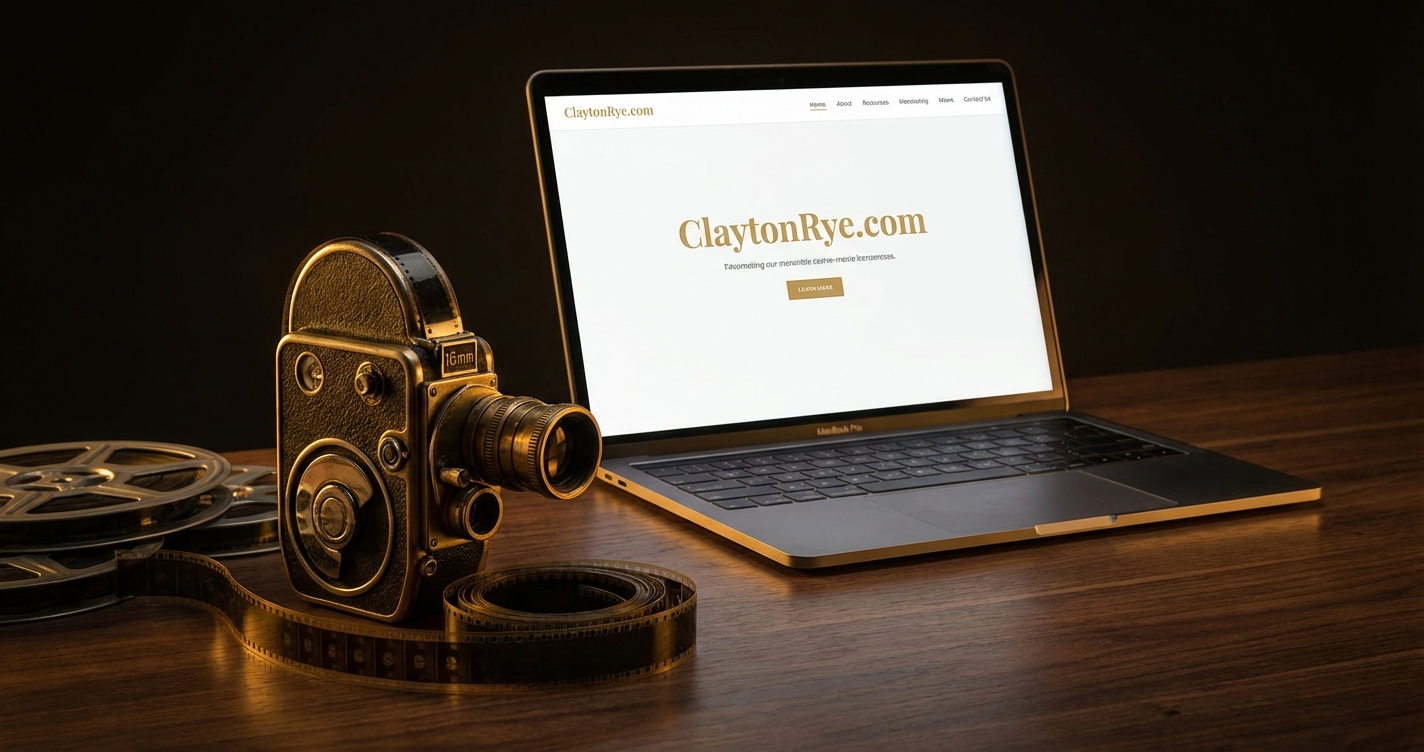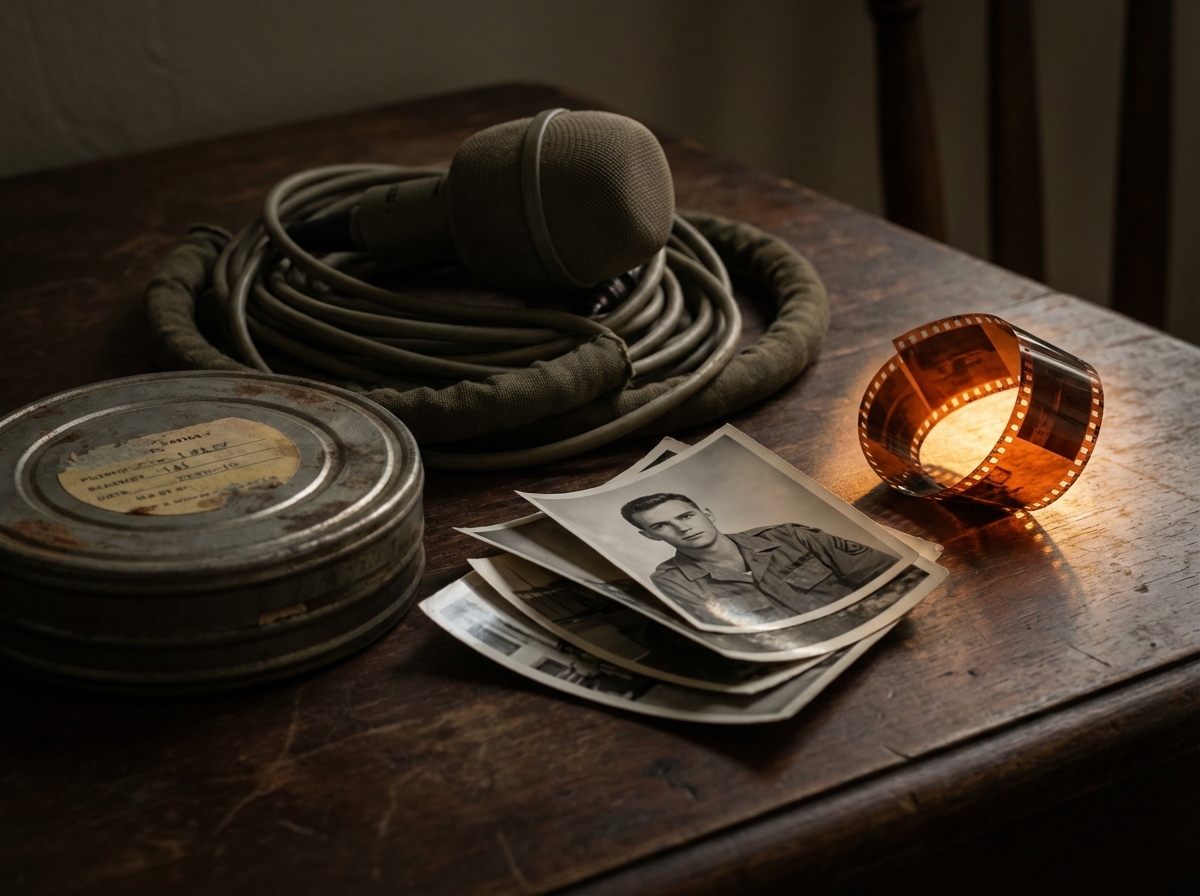
Today, October 29, 2025, my father Clayton Rye turns 77 years old. To celebrate, I’m launching ClaytonRye.com—a comprehensive website honoring his remarkable life as an award-winning documentary filmmaker, Vietnam War veteran, and Professor Emeritus at Ferris State University.
This isn’t just a birthday gift. It’s a digital monument to a life spent giving voice to the voiceless, preserving stories that might otherwise be forgotten, and teaching generations of students that filmmaking is both craft and moral responsibility.
A Life Worth Documenting
My father’s story begins in a way that shaped everything that followed: as a young man serving in the Vietnam War. From 1968 to 1970, he served in the U.S. Army’s 1st Airborne Division as a radio operator, reaching the rank of Sergeant First Class. The experience of war—its complexity, moral ambiguities, and human cost—left an indelible mark that would define his approach to storytelling for the next five decades.
After returning from Vietnam, he pursued his passion for visual storytelling, earning a BA in Advertising from Michigan State University and an MFA in Cinema from the University of Southern California. But unlike many who entered the film industry seeking commercial success, Clayton was drawn to documentary work—to stories that mattered, to voices that needed amplification, to history that deserved preservation.

The Documentarian’s Mission
Over the course of his career, Clayton created films that stand as invaluable historical documents. His work wasn’t about entertainment or profit—it was about bearing witness, preserving testimony, and ensuring that important stories survived for future generations.
Ten Vietnam Vets (1980s)
One of his earliest major works, Ten Vietnam Vets, featured firsthand accounts from fellow veterans. Having served himself, Clayton brought unique credibility and empathy to these interviews. The film won multiple awards including First Place at the Northwest Film Studies Center Festival and a Special Jury Award at the San Francisco International Film Festival. More importantly, it was selected for permanent preservation in the Texas Tech University and LaSalle University Vietnam Archives—ensuring these testimonies would endure.
Jim Crow’s Museum (2004)
In collaboration with Dr. David Pilgrim at Ferris State University, Clayton created a documentary exploring the Jim Crow Museum of Racist Memorabilia. The film examines how objects of oppression can become tools for education—how confronting painful artifacts of racism can teach tolerance and promote social justice. The documentary won Best Documentary at multiple festivals and was broadcast on PBS stations nationwide.
Detroit Civil Rights Trilogy (2010)
Perhaps his most significant work, the Detroit Civil Rights Trilogy brought to light three pivotal stories from Michigan’s civil rights history:
Last Survivor of the Ford Hunger March: Dave Moore’s firsthand account of the 1932 Ford Hunger March at the River Rouge plant, where police opened fire on over 3,000 unemployed workers during the Great Depression, killing five.
Rosa Parks of the Boblo Boat: Sara Elizabeth Haskell’s 1945 challenge to segregation in Detroit—a full decade before Rosa Parks’ famous bus protest. When denied access to the dance floor on the Boblo Island ferry, she fought back, taking her case to the Michigan Supreme Court.
Mr. Interlocutor of Mount Clemens: Duane Gerlach’s story of performing in blackface minstrel shows and his journey from participant to advocate, examining how these racist performances shaped American culture.
The trilogy won First Place for Documentary Feature at the Made-in-Michigan Film Festival in 2010, but its real value lies in preserving these stories before they were lost forever. Dave Moore was the last living survivor of the Ford Hunger March. Without Clayton’s work, his testimony would have died with him.
The Educator’s Legacy
In 1988, Clayton joined the faculty at Ferris State University, where he would spend the next 23 years teaching film production, television, and digital media production. Originally hired to teach film production, he adapted as the media landscape evolved, helping students master both traditional filmmaking techniques and emerging digital technologies.
His teaching philosophy centered on a simple but profound belief: media creators have a responsibility to tell truthful, meaningful stories. He taught his students that every frame, every edit, and every story choice carried weight. Documentary filmmaking wasn’t just about technical skill—it was about listening, researching, and approaching subjects with respect and empathy.
Countless students credit Clayton with teaching them that media can be a force for good in the world. His legacy lives on not just in his films, but in the work of the filmmakers he mentored over more than two decades.

Building a Digital Legacy
When I started thinking about what to give my father for his 77th birthday, the answer became obvious: his work needed to be preserved, organized, and made accessible. His documentaries represent invaluable historical records. His story deserves to be told. And future generations—researchers, educators, students, family members—should be able to discover and learn from his life’s work.
The Technical Challenge
Building ClaytonRye.com presented unique challenges. This wasn’t a typical portfolio site or marketing page. It needed to be:
- Archival: Comprehensive documentation of his complete filmography
- Respectful: Design that honored both the filmmaker and his subjects
- Accessible: Fast, responsive, and usable by everyone
- Discoverable: Properly structured for search engines and researchers
- Enduring: Built to last, not dependent on trendy frameworks or services
I chose Astro as the foundation—a modern static site generator that ships minimal JavaScript and prioritizes content over complexity. The site is fast, accessible, and built to endure.
Design Philosophy
Every design decision reflected Clayton’s approach to filmmaking: elegant, respectful, and focused on the stories themselves.
Typography: I chose Playfair Display for headings—a classic serif that conveys dignity and timelessness. The typography hierarchy ensures clarity without distraction.
Color Palette: A refined gold accent (#c9a961) provides warmth and elegance without overwhelming the content. The palette works beautifully in both light and dark modes.
Layout: Clean, spacious layouts with generous whitespace. The design never competes with the content—it serves it.
Performance: Aggressive optimization ensures fast loading times. Images are responsive and optimized. Videos use lazy loading. The site feels instant.
Content Organization
The site is organized around five main sections:
Films: Complete filmography with detailed information about each work, awards, distribution, and historical context. Featured presentation of the Detroit Civil Rights Trilogy with embedded trailers and supplementary materials.
About: Comprehensive biography covering his journey from Vietnam veteran to acclaimed documentarian, including education, career timeline, teaching philosophy, and key collaborations.
Service: Dedicated documentation of his Vietnam War service, including complete service record, historical context, and the connection between his military experience and documentary work.
Writing: Showcase of his written work, including his book Peckerwood and screenplay development.
Videos: Comprehensive video archive with trailers, full documentaries (where available), and supplementary content.
Technical Implementation
The site leverages modern web technologies while maintaining simplicity:
- Astro: Static site generation with component islands for interactivity
- Custom Backend: Sophisticated content management and media handling
- Theme Switching: Light/dark/system mode with localStorage persistence
- Video Integration: Lightweight
lite-youtubecomponent for performance - Structured Data: Comprehensive Schema.org markup for discoverability
- Responsive Images: Optimized images with modern formats (WebP, AVIF)
- Accessibility: WCAG AA compliant with semantic HTML and keyboard navigation
The Stories That Matter
What strikes me most about my father’s work is his unwavering commitment to stories that matter. He never chased commercial success or trendy subjects. He sought out the forgotten, the marginalized, the voices that needed amplification.
Dave Moore’s testimony about the Ford Hunger March. Sara Elizabeth Haskell’s fight against segregation a decade before Rosa Parks. The painful history of blackface minstrel shows. Vietnam veterans’ firsthand accounts. The Jim Crow Museum’s mission to teach tolerance through confronting intolerance.
These aren’t easy stories. They’re not comfortable. But they’re essential. And without documentarians like Clayton Rye, they would be lost.
Preserving What Matters
In an era of viral videos, algorithmic feeds, and content optimized for engagement metrics, my father’s work stands as a reminder of what documentary filmmaking can be: a tool for education, empathy, and historical preservation. His films don’t chase views or likes. They preserve testimony. They honor dignity. They ensure that important stories survive.
Building ClaytonRye.com has been an exercise in understanding what matters. Not flashy animations or trendy design patterns, but clear presentation of important content. Not maximizing engagement, but ensuring accessibility and preservation. Not building for today’s trends, but creating something that will endure.
The Gift of Time
My father is 77 today. The last survivor of the Ford Hunger March was in his 90s when Clayton interviewed him. Sara Elizabeth Haskell’s story might have been lost if not documented. The Vietnam veterans in Ten Vietnam Vets are aging, their numbers dwindling.
Time is the enemy of memory. Stories fade. Witnesses pass away. History gets forgotten or distorted. Documentary filmmakers like my father fight against that inevitable loss. They preserve. They document. They ensure that important stories survive.
This website is my contribution to that fight. By making his work accessible, discoverable, and properly documented, I’m helping ensure that his five decades of storytelling continue to educate and inspire long after any of us are gone.
Happy Birthday, Dad
{{ alert(type=“note”, title=“A Personal Note”, body=“Building this website has been one of the most meaningful projects of my career. Not because of the technical challenges or design decisions, but because it gave me the opportunity to truly understand the scope and significance of my father’s life’s work. Reading through his filmography, watching his documentaries, and documenting his journey has filled me with profound respect and gratitude.”) }}
Happy 77th birthday, Dad. Thank you for showing me that technology and creativity can serve purposes beyond profit and entertainment. Thank you for demonstrating that storytelling is a moral responsibility. Thank you for spending five decades giving voice to the voiceless and preserving stories that matter.
This website is my attempt to honor that legacy and ensure your work continues to inspire future generations.
Visit ClaytonRye.com: claytonrye.com
Technical Notes
For those interested in the technical implementation, the site demonstrates several patterns worth noting:
Static Site Generation with Astro
Astro’s approach to static site generation proved ideal for this project. The site ships minimal JavaScript—only what’s needed for theme switching and video embedding. Content pages are pre-rendered HTML, ensuring instant loading and universal accessibility.
Performance Optimization
Aggressive optimization ensures the site remains fast and accessible:
- Image Optimization: Responsive images with modern formats
- Lazy Loading: Videos and below-the-fold images load on-demand
- Critical CSS: Inline critical styles for instant rendering
- Font Optimization: Efficient web font loading with system font fallbacks
- Minimal JavaScript: Only essential interactivity included
Accessibility First
WCAG AA compliance ensures the site is accessible to everyone:
- Semantic HTML: Proper heading hierarchy and landmark regions
- Keyboard Navigation: Full keyboard accessibility throughout
- Screen Reader Support: ARIA labels and descriptive text
- Color Contrast: Compliant contrast ratios in both light and dark modes
- Focus Management: Clear focus indicators and logical tab order
Structured Data
Comprehensive Schema.org markup ensures discoverability:
- Person Schema: Detailed biographical information
- FAQPage Schema: Common questions about Clayton’s work
- BreadcrumbList Schema: Clear navigation hierarchy
- Optimized Metadata: Proper titles, descriptions, and social sharing
The complete source code and technical details are documented in the ClaytonRye.com project page.
Have stories about Clayton’s films or teaching? I’d love to hear them. His work touched many lives, and preserving those connections is part of honoring his legacy.
Was this helpful?
Have questions about this article?
Ask can help explain concepts, provide context, or point you to related content.